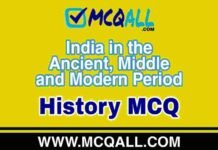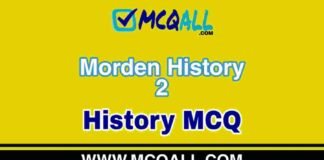Art & Culture – History MCQ Question and Answer
Art & Culture – History MCQ Question and Answer : Art & Culture – History MCQ Question and Answer is given below. This Art & Culture – History MCQ / Art & Culture – History Quiz / Art & Culture – History Question and Answer / Art & Culture – History Multiple Choice Question, Short Question, Question and Answer, Suggestion, Notes are very important for school, college and various competitive or job exams and interviews.
Those of you who are looking for Art & Culture – History MCQ Question and Answer, can read the questions and answers given below.
Art & Culture – History MCQ
- The story of Satyakam Jabal, who challenges the stigma of being an Unmarried mother, mentions –
(A) Jabal Upanishad
(B) Prashopnishid
(C) Chandogya Upanishad
(D) Kathopanishad
Answer : C
Solution: Satyakam Jabal was a disciple of Maharishi Gautama, whose mother’s name was Jabala. The story of Satyakam Jabal who challenges the stigma of being an unwed mother is mentioned in the Chandogya Upanishad.
- In which Jain Sabha was the final editing of Shwetambara Agam?
(A) In Vaishali
(B) In Vallabhi
(C) In pava
(D) In patliputra
Answer : D
Solution: During the reign of Chandragupta Maurya, the first Jain Conference was held at Pataliputra in which the Shvetambara Agam was edited. Since the ancient Jain scriptures were destroyed, the first Jain Mahasabha was organized in the fourth century BC to recolonize them, which was not attended by the followers of Bhadrabahu.
- Rath temples were built in Mahabalipuram –
(A) By the Cholas
(B) By the pallavas
(C) By Chediyon
(D) By the Chalukyas
Answer : B
Solution: The chariot temples at Mahabalipuram were built by the Pallava ruler. Rath temples are built of monolithic stone.
- The practice of child marriage started –
(A) In mauryan period
(B) In the Kushan period
(C) In gupta period
(D) In Harshvardhan period
Answer : B
Solution: The practice of child marriage started in the Kushan period (first century AD). The abolition of Upanayana in women and the prevalence of child marriage brought her to a very low position in society. In this era, the age of marriage was reduced and the girl between eight and ten years of age was considered suitable for marriage.
- In _____ column Ashoka has declared himself Emperor of Magadha .
(A) Masky’s Short Pillar
(B) Rummindai Pillar
(C) kean pillar
(D) Bhrabu column
Answer : D
Solution: In the Bhrabu (Bairat) column article, Ashoka describes himself as the emperor of Magadha. This inscription attests to Ashoka being a Buddhist.
- Which of the following four texts is encyclopaedic?
(A) Amarkosh
(B) Siddhantshiromani
(C) Brahatsanhita
(D) Asthanghriday
Answer : C
Solution: Brihatsamhita is a Vishwa Kosh composed in Sanskrit by Varahamihira during the Gupta period.
- Which of the following musical instruments is considered the best mixture of Hindu-Muslim instrument?
(A) Veena
(B) Drum
(C) Sarangi
(D) Sitar
Answer : D
Solution: Indian music inspired Muslim society to have a keen interest in music, resulting in great musicians like Amir Khusro during the Sultanate period. Amir Khusro invented the sitar by mixing Iranian tentacles and Indian veena. He made a beautiful blend of some Indian and Persian (Iranian) ragas and gave birth to some new raga styles like Imaan, Zilf and Sajgari etc.
- Jabti system was the invention of —
(A) Gayasuddin Tughlaq
(B) Sikandar Lodi
(C) Sher Shah
(D) Akbar
Answer : D
Solution: During the reign of Akbar, the Jabti system for the collection of land revenue came into force, which was based on land survey, preparation of Dastur-ulAmal and Jabti measles for land revenue assessment. This system was prevalent in most of the territory of the empire.
- The secret of the success of East India Company in India was –
(A) Lack of national sentiment in India.
(B) The Company’s army had received Western training and had modern weapons.
(C) There was a lack of national sentiment among the Indian soldiers, as a result of which someone who could pay them a good salary, could be employed in their service.
(D) All three above
Answer : D
Solution: All the above three factors were instrumental in the success of the East India Company in India. It is known that in 1599 AD, a team called Merchant’s Adventures in England founded the English East India Company or ‘The Governor and Company of Merchants Trading in the East Indies’.
- Who started the ‘Free Hindustan’ newspaper in America?
(A) Ramnath Puri
(B) GD Kumar
(C) Lala Hardayal
(D) Taraknath Das
Answer : D
Solution: Taraknath Das, the ‘Free Hindustan’ newspaper started in the US (Bankover).
History MCQ Question and Answer
See also: – History MCQ Question and Answer Click Here
Art & Culture – History MCQ Question and Answer
Art & Culture – History MCQ Question and Answer: Art & Culture – History MCQ Question and Answer – Art & Culture – History MCQ Question and Answer has been discussed above.
Art & Culture – History Multiple Choice Question and Answer
Art & Culture – History Multiple Choice Question and Answer: Art & Culture – History Multiple Choice Question and Answer – Art & Culture – History Multiple Choice Question and Answer discussed above.
Art & Culture – History Quiz
Art & Culture – History Quiz : Art & Culture – History Quiz – Art & Culture – History Quiz has been discussed above.
Art & Culture – History Questions and Answers in English
Art & Culture – History Questions and Answers in English: Art & Culture – History Questions and Answers in English – Art & Culture – History Questions and Answers in English.
Art & Culture – History MCQ Question and Answer
If you benefit from this “Art & Culture – History MCQ Question and Answer” post then our efforts will be successful. Also visit our MCQALL.COM website or follow us on various social networking sites (Telegram, Facebook, Youtube, Instagram, Twitter) to know MCQ – Multiple Choice Question Quiz on various topics, questions and answers quiz from GK and Daily Current Affairs. Thank you.












